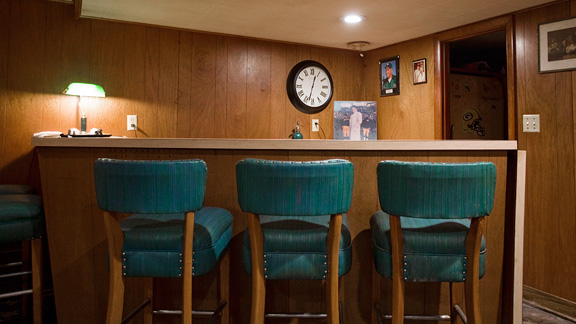ESPN STORY ON LOMBARDI'S HOUSE

A minor religion has sprung up around the modest brick house at 667 Sunset Circle. It has nothing to do with the family that's lived there for the past four decades, and little to do with the football coach who lived there before them, at least not with the actual man. That doesn't matter. Religions have always been more about faith than facts, and so pilgrims have driven past since the Gehrings first bought the house in 1969, slowing to genuflect as they approach, sometimes stopping to plead for a tour of this holy place.
It's not so strange, really. When someone dies, we look for them. We look at the things they touched, and the places they went. We look for fathers and mothers, for lovers and friends. We forget the bad, distill the good. Sometimes, every so often, the departed become patron saints. That makes us pilgrims. Those searching for courage walk battlefields. Those looking for inspiration follow Hemingway around the globe, from Paris to Key West to Cuba. Those looking for grace stand on the balcony of the Lorraine Motel. And for more than four decades, people looking for traces of the faded '50s have come to 667 Sunset Circle, looking for something they believe has been lost.
This worship is nothing new. The visitors started coming soon after the Gehrings moved in. One morning long ago, as Katie started the coffee, wearing a robe, she saw a man peering in through the window. After that, she always wore a robe around in the morning, just in case. Over the years, the family has gotten used to the lack of privacy. Once, a man lined up about 10 children on the porch for a picture. Another time, a bunch of college students piled out of a van, slammed beers and played football in the yard. Two different people have eaten Thanksgiving dinner with the Gehrings after stopping to pay respects.
"It's our home," Katie says, "but I have a hard time being rude to people."
"Andy, who was that man?" Katie asks.
"John Madden," he says.
When it comes to worshipping at the altar of Lombardi, Madden is just one of the madding crowd. When the Packers were in the Super Bowl with Favre, he came to broadcast from the house. In his wake: two semis and the Madden Cruiser. Madden told the Gehrings, "If you ever want to sell the house, call me."
Madden liked all of the house, sure, but one room called to him most insistently. He walked through the kitchen, took a left, then a quick right, and hurried down the stairs to the basement, the famous rec room, where Lombardi set up his projector, where he mixed Cutty Sark and water for friends after games.

If you walk down the stairs, you'll feel it. But the right corner, the first thing in view, is unchanged. The swinging saloon doors are propped open. The bar has a modern '50s slant. The air feels heavy with something. The turquoise-backed stools are the originals. The chrome handle remains on Lombardi's yellow fridge, tucked into the small closet. The lime-green beer opener is still bolted to the bar, veins of rust running along its edges. The sink, the shelves, the view, Lombardi's view, out into the rest of the room -- all as they were. You can almost see the men in ties, the women in dresses, the crowd moving in circles, everyone angling for a moment with the coach.
The basement was where President Kennedy called Lombardi to congratulate him after the 1961 NFL championship. This is where the coach gathered to celebrate victory and mourn defeat, the only place most people ever saw him relax, if even for just a few hours.
Maraniss recounted another moment, after Lombardi had coached his last game for the Packers, about a year before he'd move out of this house. Something, as Maraniss wrote, was ending. The NFL Films people had just shown their movie about the Ice Bowl, ending with the God-like voice of John Facenda proclaiming: "They will be remembered as the faces of victory. They will be remembered for their coach, whose iron discipline was the foundation on which they built a fortress. And, most of all, they will be remembered as a group of men who faced the greatest challenge their sport has ever produced -- and conquered."
As the film ran out, nobody moved. It was as if they knew that something would be forever lost when those lights came on. Lombardi, the very embodiment of machismo, sat there in the dark, crying. Can you imagine it?